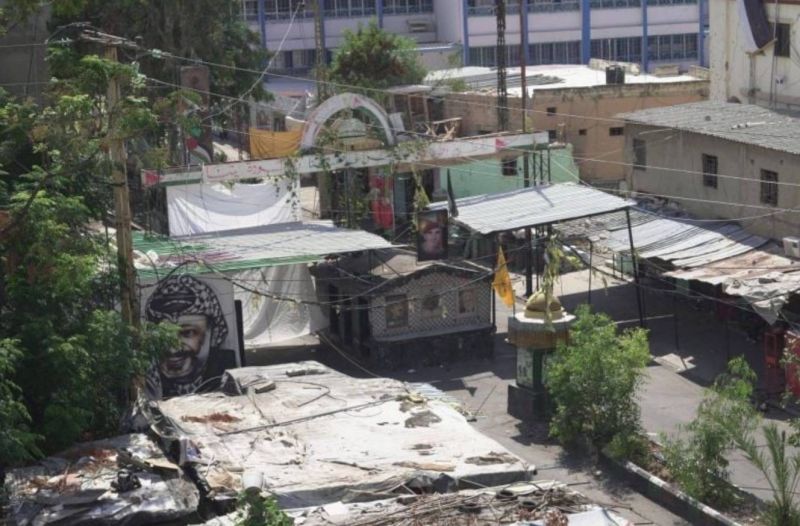
View of the Ain al-Hilweh Palestinian refugee camp, September 10, 2023. (Credit: Mohammad Yassine/OLJ)
The future of Ain al-Hilweh, Lebanon’s largest Palestinian refugee camp, is up in the air. The resumption of fighting has ravaged the camp and raised many questions, especially after attempts by the Saida municipality and some international organizations to build an emergency camp for the displaced were cut short, following pressure from the government. Some observers perceived this move as an attempt to establish the control of Islamist factions over the camp, at Hezbollah’s instigation.
‘A new Nakba’
L’Orient-Le Jour learned that on Saturday, a meeting was held between the Saida municipality, various Lebanese and Palestinian civil society organizations, and UNRWA. It was decided that 35 tents would be set up to shelter the camp’s displaced.
“We appreciate all the efforts made by our partners to provide humanitarian assistance,” said Dorothee Klaus, director of UNRWA Affairs in Lebanon, to L’Orient-Le Jour. “We are concentrating our efforts on meeting urgent and immediate needs, especially as the conflict is destroying homes and infrastructure in the camp.”
Not everyone warmed to the idea of building a camp for the displaced.
“It’s a mistake on the part of the municipality, which started out with good intentions,” said Saida MP Abdul Rahman Bizri to L’Orient Le Jour after the backlash.
When the Ain al-Hilweh camp was initially constructed, it was not received well by locals at the time. The proposition of building another camp brings back flashbacks.
“When a refugee camp is set up in Lebanon, it is difficult to remove it,” said Mohanad Hage Ali, a researcher at Malcolm H. Kerr Carnegie Middle East Center. Parties in Saida fear that the new camp will become yet another permanent urban agglomeration — another Ain al-Hilweh.
In a press release, al-Jamaa al-Islamiya, a party affiliated with the Muslim Brotherhood and active in Saida, also denounced the “security and political implications” of setting up tents to house displaced families. The party called on the municipality to “dismantle the encampment and transfer the displaced people to a safer and more dignified place,” arguing that “the alternative to fighting must not be to set up camps, which do not protect against stray bullets.”
Bizri agreed: “The inhabitants of our town have no need of a new lawless zone, which would have an impact on the security situation, and on the economy,” he said.
In practice, the Lebanese state has almost no jurisdiction over the Palestinian refugee camps in the country, which are left at the mercy of rival Palestinian factions. The Ain al-Hilweh clashes have claimed the lives of 13 people, and spilled over into surrounding areas. Stray bullets wounded civilians and five Lebanese army soldiers outside the camp. Despite the chaos, the intervention of the Lebanese Army remains a very risky option, and has not been considered by the institution so far.
“The Lebanese army no longer has the resources it had in 2007, when it carried out an operation to dislodge terrorists from the Nahr al-Bared camp in Northern Lebanon,” said Hage Ali. “Today, the troop has been hit hard by the crisis and cannot afford a similar operation.”
But it’s not just the Lebanese who opposed the idea of new camps. “The Palestinians also saw it as an attempt to make them leave their homes for good once again, a sort of new Nakba,” said Bizri, in reference to the mass exodus of 1948.
‘Dangerous game’
Another controversial point is the location of the new camp, proposed to be built at Saida’s northern entrance, near the Rafik Hariri stadium. “While the Ain al-Hilweh camp is located to the south of Saida, the construction of a new camp at the northern entrance could get the city surrounded,” said a Saida politician who requested anonymity.
Control of the Palestinian refugee camps is an important strategic issue. Since the end of July, the Ain al-Hilweh camp has seen sporadic clashes, speckled with tit-for-tat vendettas, between members of the Fatah movement and Islamist groups, including Jund al-Sham.
Calls for a truce have come from all sides, but have failed. According to many observers, Hezbollah is purposely galvanizing the Islamist factions with the aim of weakening Fatah in favor of its ally, Hamas, and extending its influence over the Palestinian camps. In 2017, similar clashes between nationalists and Salafist Palestinian factions took place in the neighboring Mieh Mieh camp. The clashes ended with a Hamas victory, but without a scratch.
“The process is a long one, but the nationalists could continue to weaken as a result of repeated attacks by the Islamists against executive and influential figures, as well as internal divisions that already existed before the clashes began,” said Hage Ali, suggesting that the Ain al-Hilweh camp could eventually fall into the hands of the Islamists.
“Setting up a second camp to the north of the town could also be a consolation prize for Fatah, since the movement’s leaders and their families could take refuge there, leaving Ain al-Hilweh to the Islamists,” said the anonymous Saida politician.
Hage Ali rejects this theory. “When calm returns, the displaced people who have not left Lebanon will probably return to Ain al-Hilweh,” he said. “But the new political context in the camp is likely to be unpredictable, even for Hezbollah, which by strengthening the same groups it fought in Syria, is playing a dangerous game.”
This article was originally published in French in L'Orient-Le Jour. Translation by Joelle El Khoury.